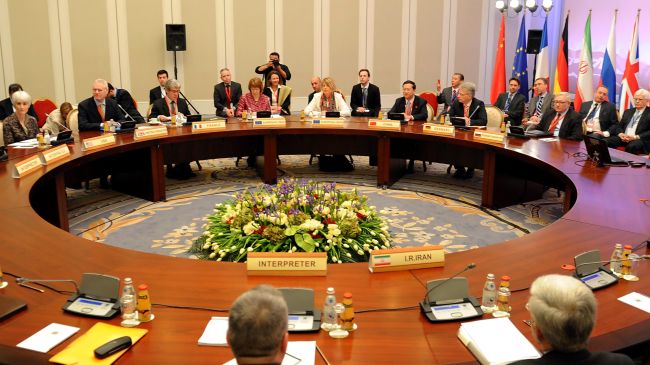Despite efforts by world powers and Iran, nuclear dispute still unresolved

By Sara Rajabova
World powers and Iran failed again to resolve the nuclear dispute after the latest round of talks held in Almaty, Kazakhstan on April 5-6.
As in the previous talks Iran reportedly showed its readiness to solve the decade-long dispute but the differences over its nuclear program remain unresolved.
Iran declined to accept or reject an offer presented by the world powers during talks in February on easing some sanctions in exchange for curbing some of its nuclear work.
But instead Iran presented a comprehensive operational plan to the P5+1 group of world powers and said it is now up to the group to decide on how to respond to Tehran's proposals.
Following the latest round of the talks between Iran and the P5+1, EU foreign policy chief Catherine Ashton, who represents the group of six powers, said the two sides of the negotiations "remain far apart on the substance" of the talks.
She added that the P5+1 group has talked in much greater detail than ever before, and the efforts will continue in that direction.
However, Secretary of Iran's Supreme National Security Council Saeed Jalili noted that Western countries "have to move away from a hostile approach toward Iran", and that confidence-building is a "two-way avenue", which should not deprive Iran of its rights.
A senior U.S. official said there had been no breakdown in the negotiations and suggested that a willingness by Iranian negotiators to engage in detailed dialogue about the six nations' proposal was the most useful sign in years, Reuters reported.
Besides, Russia has expressed hope for the continuation of talks between Iran and the P5+1 group.
Russian Deputy Foreign Minister Sergei Ryabkov said that the recognition of Iran's rights under the Treaty on the Non-Proliferation of Nuclear Weapons (NPT) is the only solution to the West's dispute with Iran over its nuclear energy program.
The negotiation sides even haven't decided on a venue and time of the next meeting. But EU foreign policy chief Ashton said she will be in touch with Supreme National Security Council Secretary Jalili "very soon in order to see how to go forward."
In the meantime, Iran raised the issue of withdrawal from the nuclear non-proliferation treaty.
Alaeddin Boroujerdi, chairman of the Iranian parliament's Committee for Foreign Policy and National Security, said that if the West does not recognize Iran's right to use nuclear energy, the issue of the country's withdrawal from the NPT can be submitted for discussion by parliament.
Western governments are likely to impose more economic penalties if the talks fail to produce sufficient progress.
On the other hand, some diplomats and experts believe Iran's June presidential election fuels uncertainty in the West over Iran's strategy for nuclear diplomacy. They say Iran may play for time, trying to keep diplomacy on track to avert new sanctions before the June election.
Israel's Strategic Affairs Minister Yuval Steinitz warned in a statement that Iran was trying to use the negotiations to gain time to advance its uranium enrichment program.
Steinitz urged for more aggressive stance to make it "unequivocally clear to the Iranians that the negotiation games are finished."
Steinitz told Army Radio action should be taken within "a few weeks, a month" if Iran did not curb its nuclear program.
Steinitz cited North Korea's threat to use nuclear weapons against South Korea and the United States as an example of what Israel, widely believed to have the only nuclear arsenal in the Middle East, fears could happen if Iran managed to produce a nuclear weapon.
However, after the latest talks in Almaty, US Secretary of State John Kerry said it is important to continue negotiating and to try to strike common ground.
"We remain open and hopeful that a diplomatic solution can be found," he said.
Earlier, US President Barack Obama said during a visit to Israel that diplomacy was the best option, but he hinted at possible military action as a last resort.
Meanwhile, foreign currency exchange rates in Iran have risen after the second round of nuclear talks in Almaty last week.
Tehran and the P5+1 have held several rounds of talks mainly over Iran's nuclear energy program.
The United States, Israel and some of their allies have repeatedly accused Iran of pursuing non-civilian objectives in its nuclear energy program, with the United States and the EU employing this as grounds to impose several rounds of sanctions against Tehran.
Tehran refutes the allegations, saying that as a signatory of the nuclear Non-Proliferation Treaty and a member of the International Atomic Energy Agency, it has the right to enrich uranium for peaceful purposes.
Here we are to serve you with news right now. It does not cost much, but worth your attention.
Choose to support open, independent, quality journalism and subscribe on a monthly basis.
By subscribing to our online newspaper, you can have full digital access to all news, analysis, and much more.
You can also follow AzerNEWS on Twitter @AzerNewsAz or Facebook @AzerNewsNewspaper
Thank you!
